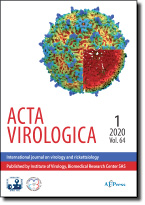Acta Virologica Vol.67, No.1, p. 3 – 12, 2023
|
| Title: Sensitive SARS-CoV-2 detection, air travel Covid-19 testing, variant determination and fast direct PCR detection, using ddPCR and RT-qPCR methods |
| Author: Tatiana Burjanivova, Eva Lukacova, Vincent Lucansky, Marek Samec, Petar Podlesniy, Zuzana Kolkova, Lenka Reizigova, Marian Grendar, Eva Turyova, Veronika Holubekova, Bibiana Malicherova, Vladimir Nosal, Ivana Kasubova, Robert Dusenka, Denisa Osinova, Jana Hosalova Matisova, Dana Dvorska, Dusan Brany, Zuzana Dankova, Elena Novakova, Andrea Calkovska, Erika Halasova |
|
Abstract: Severe acute respiratory syndrome coronavirus 2 (SARS-CoV-2) monitoring in air traffic is important in the prevention of the virus spreading from abroad. The gold standard for SARS-CoV-2 detection is RT-qPCR; however, for early and low viral load detection, a much more sensitive method, such as droplet digital PCR (ddPCR), is required. Our first step was to developed both, ddPCR and RT-qPCR methods, for sensitive SARS-CoV-2 detection. Analysis of ten swab/saliva samples of five Covid-19 patients in different stages of disease showed positivity in 6/10 samples with RT-qPCR and 9/10 with ddPCR. We also used our RT-qPCR method for SARS-CoV-2 detection without the need of RNA extraction, obtaining results in 90–120 minutes. We analyzed 116 self-collected saliva samples from passengers and airport staff arriving from abroad. All samples were negative by RT-qPCR, while 1 was positive, using ddPCR. Lastly, we developed ddPCR assays for SARS-CoV-2 variants identification (alpha, beta, gamma, delta/kappa) that are more economically advantageous when compared to NGS. Our findings demonstrated that saliva samples can be stored at ambient temperature, as we did not observe any significant difference between a fresh sample and the same sample after 24 hours (p = 0.23), hence, saliva collection is the optimal route for sampling airplane passengers. Our results also showed that droplet digital PCR is a more suitable method for detecting virus from saliva, compared to RT-qPCR.
|
|
| Keywords: COVID-19; RT-PCR; ddPCR; SARS-CoV-2; nasopharyngeal swab; saliva |
|
|
Published online: 19-Jan-2023
|
| Year: 2023, Volume: 67, Issue: 1 |
Page From: 3, Page To: 12 |
doi:10.4149/av_2023_101
|
|
 download file download file |
|
|
|
|
 download file
download file
